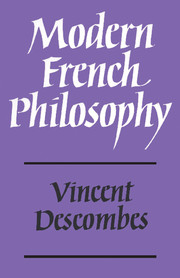Book contents
- Frontmatter
- Contents
- Foreword by Alan Montefiore
- Note on abbreviations and translation
- Introduction: Philosophy in France
- 1 The humanisation of nothingness (Kojève)
- 2 The human origin of truth (Merleau-Ponty)
- 3 Semiology
- 4 The critique of history (Foucault, Althusser)
- 5 Difference (Derrida, Deleuze)
- 6 The end of time (Deleuze, Klossowski, Lyotard)
- Index
5 - Difference (Derrida, Deleuze)
Published online by Cambridge University Press: 05 June 2012
- Frontmatter
- Contents
- Foreword by Alan Montefiore
- Note on abbreviations and translation
- Introduction: Philosophy in France
- 1 The humanisation of nothingness (Kojève)
- 2 The human origin of truth (Merleau-Ponty)
- 3 Semiology
- 4 The critique of history (Foucault, Althusser)
- 5 Difference (Derrida, Deleuze)
- 6 The end of time (Deleuze, Klossowski, Lyotard)
- Index
Summary
Hegel had said that difference is contradictory in itself. But the question now is to pave the way for a non-contradictory, non-dialectical consideration of difference, which would not envisage it as the simple contrary of identity, nor be obliged to see itself as ‘dialectically’ identical with identity. In tackling this difficulty, French philosophy – in the form of Gilles Deleuze and Jacques Derrida – at last approaches the crux of the matter. We come finally to that remarkable point of modern metaphysics which all preceding discourse had indicated like a flickering compass. This metaphysical point may be situated in two ways.
1. In the language of logic (or of ontology), the question is that of the ‘dialectic’.
2. In the language of the philosophy of history (or of metaphysical theology), the question is that of ‘the unity of man and nature’, as Marx called it; the meaning of this unity is precisely the meaning of identity, as defined by the dialectic.
The order that I now propose to follow – first Derrida, then Deleuze – is arbitrary, but no more so than the reverse.
The Radicalisation of Phenomenology
At the beginning of the sixties, there was much talk concerning the ‘end of philosophy’. It was thought that the western ratio, its resources exhausted, was nearing the end of its run. The phrase, ‘end of philosophy’, was taken from Heidegger, and put to a great variety of uses.
- Type
- Chapter
- Information
- Modern French Philosophy , pp. 136 - 167Publisher: Cambridge University PressPrint publication year: 1981



